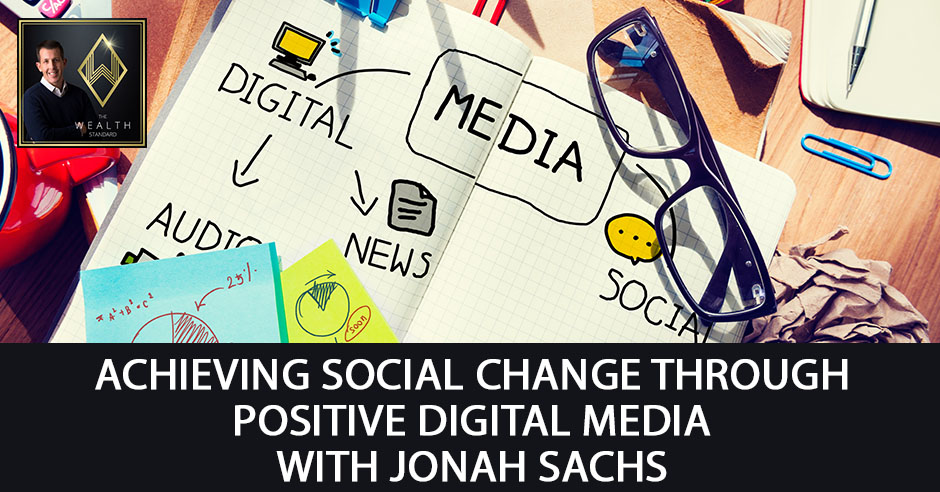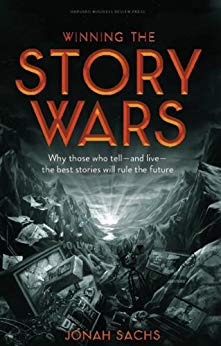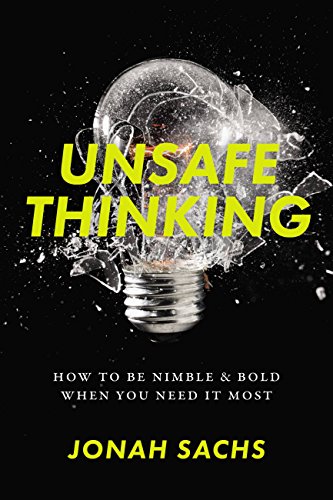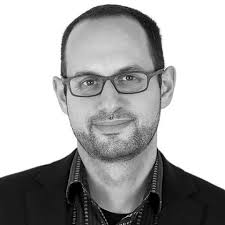Podcast: Play in new window | Download

A lot of change and influence can be made through business because that’s where the majority of people spend the majority of their time. Author, speaker, and viral marketing pioneer Jonah Sachs uses digital media and books to bring about the ideals or the values of social change such as equity, empowerment, responsibility, transparency, and advocacy. Jonah is the co-founder of Free Range Studios which created the short flash animation critical of factory farming and industrial agricultural practice that has been translated into more than 30 languages and watched more than 30 million people. He is also the New York Times bestselling author of Winning the Story Wars and Unsafe Thinking. Jonah talks about those values and what he’s advocating and trying to shift.
—
Listen to the podcast here:
Achieving Social Change Through Positive Digital Media with Jonah Sachs
Simon Sinek has referred to business as the infinite game where the objective is not the market cap or income or the number of positions on the Fortune 500 list. The objective is to keep playing. I’m intrigued by how rapidly business is evolving. How a business is capitalized and has changed the workplace and culture, operational cycles, benefits and compensation and marketing. My guest is going to speak to all of these points that I’ve mentioned. His name is Jonah Sachs. He is the bestselling author of Winning the Story Wars, which was written in 2012 and a fascinating book especially in regards to marketing and his new book which is called Unsafe Thinking.
—
My guest is the Cofounder of Free Range Studios, which created The Meatrix, a short flash animation critical of factory farming and industrial agricultural practices. It has been translated into more than 30 languages and watched by more than 30 million people. He’s also the New York Times bestselling author of Winning the Story Wars: Why Those Who Tell – and Live – the Best Stories Will Rule the Future. He also has a book out, which I’m excited to talk about called Unsafe Thinking: How to be Nimble and Bold When You Need it Most. Jonah Sachs, welcome to The Wealth Standard podcast. Thanks for joining us.
Thank you so much for having me. It’s great to be here.
You’ve written these books. They have very incredible concepts and you explain it in a very meaningful and easy way. When you’re writing, who are you writing for? Who are you most wanting to impact and influence?
As the world changes more and more quickly, a lot of our basic safety needs start to become unmet. Click To TweetI found myself halfway through my career beginning to write business books and it was never what I expected to do. I was an artist, a creative trying to go out and change the world. In that business space, as I dipped into it, I realized that there was so much that business and people working in business could influence, but they were still very much human beings. My books in some ways are this weird mixture of self-help accessing those parts of your creativity you always knew you had but didn’t know how to release but in that work in business context. My first book about storytelling, Winning the Story Wars, is both a manual for how to do better marketing but also a bit of a spiritual journey into the great myths and stories that drive us and a call for higher level human values. My second book, Unsafe Thinking, is how to unlock creativity in your organization so your teams get more productive but also how to confront your own fears, your own stuck points and just become a better learner, a better human being. I’m not sure if it’s too weird combination but that’s what I’m attracted to.
Especially in this day and age, the progress and the evolution of a business in general is fascinating to observe. There is a lot of change and influence that can be made through business. That’s where the majority of people spend the majority of their time. You hit on something that I was curious about. I’ve read this on your website or on your bio. It states that you use digital media, book media too, to bring about the ideals or the values of social change. You list equity, empowerment, responsibility, transparency and advocacy as those ideals or values. Could you speak to that and talk about maybe some examples or specifically about those values, what you’re advocating and what you’re trying to shift?

Winning the Story Wars: Why Those Who Tell – and Live – the Best Stories Will Rule the Future
I started my business in 1999 when I was 23 years old. That was a time where the internet was starting to give people the opportunity to communicate entirely differently. We don’t even think about it anymore because we’re so used to it. At that time, we were all living in a world where television would tell you what to think and what to do. You would watch advertising and you’d sit there waiting for your show to start and you’d have no way of responding or talking back. What came about in that broadcast era was what I call inadequacy marketing. We’re going to tell you that you smell bad, you’re not smart enough, you’re not good enough. Basically, you stink. Without our product, which is the hero of the stories we tell, you’re not going to live your best life. People would sit there and be like, “I’m not that cool. Maybe if I buy the right car, the right shirt or whatever, I’ll be acceptable.” That was the engineer. That was the idea of communications.
I came of age where I started noticing people were sending around emails about things that they most cared about. Those emails were starting to go viral. Friends were passing along. “My mom has cancer. I’m getting passionate about cancer research. Will you help me?” You’re advertising in a way, this peer-to-peer, passing these ideas along. I started to notice that the ideas that tended to stick in that medium were different. They weren’t about how weak and lame and stupid our friends are. They were telling people, “I love you. You can be great. You have a bigger part to play.” I call that beginning of empowerment marketing. You don’t tell someone how weak they are, you tell them how strong they can be through a relationship with you.
I came to find out later that all our great myths and stories, Joseph Campbell’s Hero’s Journey is based on ordinary people making extraordinary change. When we get a chance to share the ideas that we want, we often try to lift each other up and reach for higher human values. There’s some psychology and science behind this. That was my clue that in some ways, messages that connect to our deepest passions and who we are as humans have this natural advantage in this new media world. Social media has again degraded the conversation in many ways that I didn’t predict, but I do think that business now is no longer succeeding by making people feel insecure and inadequate. It succeeds when it makes people reach for their higher values more often.
Maybe to expand on a few of those points, where do you see the inequity? In what areas do you see the inequity associated with society? I agree with a lot of what you’re saying. There’s fear associated with the human experience. Fear has been used in a number of different contexts, whether it’s the workplace or the education system. Where do you see the biggest opportunity to create that balance or the creation of equity as opposed to inequity?
Cognitive diversity within companies is what creates creativity. Click To TweetWhat’s happened over the last 150 years, not just in the last ten years which were things that are accelerating is in many ways we’ve become mechanized. Human beings have been put into factories. We’ve been put in schools that are teaching us how to bend, then go work in factories. We’re being commoditized in a sense and our own creativity and sense of multifaceted identities have been crushed down to, “How do you make enough money to feed your family and get by?” In many ways, life has gotten better for many people. We can meet our material needs to some degree, although now we’re seeing a lot of people are struggling to do that in our society. We’re having trouble feeling like our communities, we are part of something larger. That loss of meaning, it never gets completely lost because we’re always talking about it. It’s become a huge issue in our society. People are talking about protecting jobs from going overseas, but these are factory jobs that are already dehumanizing. How do we find ways to recapture our creative full sense of self where work and contribution to our community and community institutions are all strong?
The internet and digital media promised in some ways that we would reignite our sense of agency. Now we see how so many of these tools are sucking more life out of local communities. More money is just going to Silicon Valley and people are feeling less empowered even though they’ve got plenty of time to be on Facebook. Even their own data is now being commoditized by somebody else. I feel like we do live in this world where there are a few winners and a lot of people who are just asking, “Where do I fit?” Whether they’re doing okay or not well at all. I did this thing called The Story of Stuff, this video series that’s very popular and viral. I was telling people shopping is not the point of life and that our consumer society is, in many ways, not bringing us happiness and it’s ruining the planet. That resonated. People shared it at huge levels. I try to rehumanize our economy I suppose. It’s a big question but there’s equity everywhere but we have the opportunity to heal some of them because we’re so connected now as a society.

Unsafe Thinking: How to be Nimble and Bold When You Need It Most
A few years ago, I remember reading a lot about the Hierarchy of Needs by Maslow. It’s deep because I started to see how individuals were driven and motivated. 150 years ago, people didn’t have time in the day to think about how they were going to impact the world because they’re wanting to feed their families. That’s pretty much it. There wasn’t much time for anything else. I know you talked a lot about safety in Unsafe Thinking but safety is that next rung. It’s relationships after that and then self-esteem and self-actualization. As society is progressing, it’s fascinating to look at what technology has been able to do, which is to make the physiological needs a lot more efficient to an extent as well as safety. This is relative as compared to 100 years ago or so. Then I looked at the idea of relationships and people seeking those and then seeking meaning in their work and relevance in the world.
It gives me a chuckle looking at social media and what people are trying to obtain as far as their needs are concerned as it relates to what they post or what they say or how they respond. I look at the phase of society that we’re in right now. It’s becoming almost a cliché like, “Be the person that you pretend to be on social media,” or some meme like that. I look at your book and it’s fascinating because essentially in a sense, it’s one of those paths to get from a fear-based ego driven mindset to discovering meaning. Whether it’s in your work or the influence you have on society and the impact that you make in your community. How did you get to this mindset as far as understanding these ideals or principles and then writing about them in an incredible way?
I hadn’t thought of this before you mentioned Maslow’s Hierarchy in this question but in some ways, what’s happened to our society is we have found all these ways to meet our physiological needs, to meet some of our basic safety needs. As the world changes more and more quickly, a lot of our basic safety needs start to become unmet because we get so stressed out. The world is changing so fast we feel suddenly not stable anymore. That shuts down our creativity. I had never thought of it before along Maslow’s Hierarchy, which I wrote about my first book but it’s true. If you feel safe and secure, you’re going to be able to go out and be creative. Creative is a higher level of Maslow’s Hierarchy than just basic safety. What I write about in Unsafe Thinking is what tends to happen when we confront a changing world is we feel anxiety. That’s just natural. It’s part of the human response. If you try to not to feel anxiety, you’re going to feel more of it. It’s called experiential avoidance and you talk yourself into not feeling things, you feel stronger. If you feel anxiety and when we do, there are all these processes in the brain that cause us to shut down our creative capacities.
We do this partly because anxiety back on the savanna, a mental lion was jumping out at you. Someone’s going to kill you. You don’t sit down and whiteboard a bunch of ideas. You just run away. You do the most obvious thing to do. We’re programmed under conditions of anxiety to shut down new thinking, but when the world is changing faster and faster, it’s the new thinking we most need. That’s what I call the safe thinking cycle. We get nervous, we say we’ve got to do something different but then we’d go to work and we do the exact same thing and we wonder why and say, “Tomorrow, I’ll do something different.” Now, it’s even more urgent so we have the less likelihood of doing anything different the next day. It turns out the way out of that cycle is not to try to avoid situations that cause anxiety. It just makes us smaller and smaller. We have to reframe anxiety as fuel for creativity. When we say, “Nothing I’ve ever done before that was creative happened without me feeling incredibly anxious, without moving into spaces that scared me. That’s where my creative edge is out of my comfort zone there.” There’s good science about how we can talk to ourselves about seeking and moving towards anxiety rather than finding ways to avoid it, to unlock creativity.
We live in a time where it's considered traitorous to even think on your own, and that's too bad. Click To TweetI learned this myself because I built this company around experimentation and fun, wacky cartoons and ideas. As I became more and more of an expert and people came to me saying, “Can you repeat what you did in the past? Can you get me some of that viral activity?” I became less experimental and exploratory and I scaled my company from 2 to 40 people. I started making all these rules and processes. I started getting less and less creative and less and less happy as I started achieving those goals that I thought would make me happy. I tried so hard to change myself, but I was so stuck in that safe thinking cycle that I couldn’t. I had to go out and read a ton of science and talk to 100 people who I admired. It was only in doing that that I started to understand my own brain enough to learn how to start making a change. I turned that into a book.
Was there a gradual process as you were interviewing people and talking to people or were there a handful that totally smacked you in the head and made you have those types of epiphany moments?
A lot of times we think that the big questions are unfathomable and there is no answer to. If you start to ask the right people, you find that the people have thought about this before and they have answers. One of the first people that opened my eyes, and it didn’t happen until the conversation was over, was Steve Kerr, the coach of the Golden State Warriors. He told me this amazing story. When I told him this idea of Unsafe Thinking, I was like, “How do we get out of our patterns? How do we take risks? How do we change ourselves when we need it most?” He laughed at me and he was like, “It’s all about getting safe.” I was like, “I’m going to have to hang up the phone because you’re not going to support my thesis here.” He told me this story and then came back around to help me out. He told me this story about how when he first came up in the league, he was skinny. He wasn’t very tall. He’s a great three-point shooter, but he felt like he was an imposter. He didn’t belong in the league.

Digital Media: If you don’t sit down with your enemies and get face to face with them, you’re not going to find those solutions.
When he got the ball at a big moment, he would pass but it would always be to Scottie Pippen or Michael Jordan. No one ever thought, “Why are you passing the ball?” He just went and pass it and he’d get away with hiding. One time when Michael Jordan had the flu in game six of the finals, it might have been against the Jazz, he couldn’t pass, he put up the shot and ended the series. He realized how much time he had been wasting feeling like he didn’t belong. He said, “When I became a coach, I realized I had to help my guys first feel that they belong before we could go out and take any risks at all. I did two things. I made a space where there was the locker room and another space which was the arena. In the locker room, I made it completely safe for them to be themselves, to feel like they belong, to feel like they could take risks so that when they went on the court in the arena, they could get truly unsafe and play this whole new brand of basketball.”
There’s a lot of science that then flowed out of this about psychological safety and if you want a creative company, you need to have not too many rules and too many processes. First, you have to make sure that your people feel safe and if they don’t, they’ll never take the big risks. That was a complete counterintuitive shift for me where I was thinking, “How do you unburden yourself and just go crazy?” It’s about making sure that everyone feels that comfort and protection. In Maslow’s Hierarchy, get those basic needs met and your company is going to flower. There’s a lot of stuff you can do to make that happen. Changing incentive structures, celebrating rulebreakers, incentivizing productive failures and good questions rather than getting the right answers. All these things I talk about in the book about how do you unleash that creativity and your company?
I look at an environment of a business mainly from personal experience. The environment does dictate how people manage anxiety and deal with anxiety or manage fear or take risks to become creative or to be creative. This is more on a micro scale as far as business is concerned. Going back to what we were talking about in the beginning, how are you seeing maybe this mindset or paradigm that people have affecting more of macro things? The country is in a very divisive position mostly in a political sense, but do you see an impact in society on a macro level based on companies that are championing some of these ideals?
The more that you spend time in your area of expertise, the slower you learn. Click To TweetI looked quite a bit of how companies overcome and how they can create new communities within the companies that get far more creative. I don’t yet know that those experiments are now bleeding out into making a more productive society. I talked in the book about some social change makers who have managed to do exactly that and then inspire companies, the other way around. For instance, I tell the story of Jeffrey Brown who was a minister in Boston and how the most murders in Boston happen in his neighborhood. He wanted to build this church, but no one comes to church because it was so dangerous. He wanted to work with the at-risk youth. He had this idea that there are enemies out there, the gang members were killing everyone. As a Christian minister, he hated them. He wants to find these at-risk youth and protect them but none of the at-risk youth would come to him.
One day a kid died outside of his church in the middle of the night and he realized he wasn’t even there to do anything because he was never at the church at night. He’s never on the streets at night. He walked around the streets one night and he met his enemies, the gang members and he started talking to them, a harrowing moment for him. They knew exactly what was needed to stop the violence and Brown connected them to the police. He connected them to the mayor and they did this thing called the Boston Miracle. They collaborated on solutions which brought murders in Boston down 66% and started scaling across the nation. What Brown told me was, “If you don’t sit down with your enemies and get face-to-face with them, you’re not going to find those solutions.” In companies, that’s true too. Cognitive diversity within companies is what creates creativity. A lot of companies had been hiring for cultural fit, finding people that we get along with who are like us, who share our values. That means you wind up with these very narrow solutions. We’re learning to tolerate people that we don’t particularly like who challenge us, who don’t share our values which is very important. It’s that face-to-face interaction and that grit that allows us to express ourselves to others who don’t agree with us that unleashes our creative abilities.
I looked at some science that said if you go and read news sites to open your mind that doesn’t agree with your political point of view, it’s called the backlash effect. You’re going to be even more entrenched in your original view because you’re going to come up with all these ideas why this is a conspiracy and it’s not true and all this stuff. If you sit down with somebody and have lunch who doesn’t agree with you, you’re not going to convince each other and change each other’s minds but you’re both going to get smarter. I love that idea and I feel like to this political question, if you can have some friends on the other side of the aisle and have goodwill conversations with them, without that fear that one of you is going to win and one of you is going to lose, it expands your mental capacities and your ability to create great messages and great products.

Digital Media: The idea is not to try to radically reform ourselves all at once, but to try to take baby steps toward a more flexible mindset.
I see it and maybe I have a tainted view of things, but I do see a lot of companies that are acclimating to this newer environment where it’s not a 30-year, 40-year career. There is a transient type of employee-base trying to discover meaningful work. At the same time, the environments of companies are adjusting just at a sheer competition. Still looking at the political environment, people are not sitting down and having conversations where the barrier of fear of being wrong is a steel wall. I look at certain signs of whether it’s authors like you, influencers like you, Simon Sinek is in that camp as well and there are a lot of podcasts talking about it, a lot of media talking about.
It’s exciting to me because nothing good comes from being afraid of being wrong and defending a position just out of fear and not out of wanting to understand. I love the message and it’s one of those messages whether it’s for business or for pursuing a career as an individual. That’s the grassroots idea behind it. Hopefully, the momentum continues because we need some help. There’s just so much crap going on in society and the younger generation, I would say under 45 years old, is grasping some of these things even though we have some major challenges. Do you see the same thing or are you still seeing some rift?
It would be crazy to say that there are no rifts. They’re out there. I do think that you’re right. There’s an interest in understanding ourselves and that’s maybe a little bit new. You mentioned podcasting and this idea that people are now interested in tuning into long-form thinking and interested in brain science and books like business books that are coming out that teach us how our minds were popularized under the deeper science. I do think there’s a hunger for it. One of the pieces of advice I got from one of the people I interviewed, a psychological researcher said, “The most important thing is that we think about how we’re thinking.” Bringing that mindfulness to look at your own brain and being like, “How did I get to this idea and how do I generally think? Might I try some different ways of thinking?” That brings me hope.
When you humble yourself and do something that you're truly bad at, you get all kinds of creative benefits. Click To TweetI do think that younger people still have that opportunity to reprogram or to question some of their foundations whereas older people, especially if they’re feeling insecure and stressed out and being left behind, maybe are less likely to want to look at those underpinnings. Whether the left is right or the right is right or you’re believing your political beliefs, if you’re not stepping back at least and questioning where they come from and where could you be wrong, I think you are missing the opportunity. That doesn’t make you a traitor to your tribe just to have those questions, but we live in a time where it’s considered traitorous to even think on your own and that’s too bad.
I do see signs that there’s acceptance of others. It’s definitely an uphill battle because of how ingrained society has become. A lot of what we mentioned, whether it’s cool or whether it’s the workforce or especially during the industrial era of how people were trained as far as being workers and being told what to do and not thinking for themselves. This is humanity and most people are seeking meaning. They are seeking fundamental ideals. It’s the influence of their societal surroundings that’s very difficult to create new neural pathways. There is a lot of focus on it from what I’m seeing and you’re a part of it. How can people follow you to learn more about what your mission is, learn more about what you’re up to and also get the book?
They can find me at JonahSachs.com or @JonahSachs on Twitter. My books are available wherever you shop for books online. Please check them out.
Any final thoughts or words regarding our topics of conversation?
I often get asked in interesting conversation at a high philosophical level which I personally enjoy is, “What can I do tomorrow? How can I unlock my creativity or play with this or test this out?” People want to know how do you just taste it? A couple of pieces of advice I could give if you’re thinking along those lines is one, go out and do something that you’re bad at. The more that you spend time in your area of expertise, the slower you become to learn. If you think of yourself as an expert, you’re more likely to be wrong in most situations. When you humble yourself and do something that you’re truly bad at, you get all kinds of creative benefits. If you can carve out an hour a week to do things that you’re terrible at, that might jog some new creative capacities we talked about.
Go out and find someone who doesn’t agree with you, spend a little time and take them out to lunch. It can be powerful and generative. I would just say back to that point and anxiety is the next time you’re feeling anxiety and nervousness, most of our automatic reactions are to find a way to take that anxiety away to get around it. I would just say notice it, mean it. Maybe even talk about it with your team and then see that as a chance to move forward it. What would it mean to go deeper into it as opposed to find an automatic way around it? If you try any of those things and they work for you, then you can start to pick up on other ones. I believe that the idea is not to try to radically reform ourselves all at once, but to try to take baby steps toward more flexible mindsets.
There are these signals that we all have, the responses to certain circumstances. Fear and anxiety are one of the more powerful emotions and influences, but they’re contextualized as a bad thing. In your book, you talk about them. The context is a signal that there’s an amazing learning opportunity. I look at the most painful situations I’ve ever been in that had been my most profound moments that helped me and changed me the most. If that context is reframed, then it’s one of the most powerful things that can help a person as far as their growth is concerned.
We all spend a ton of time trying to avoid those moments that you’re talking about. Luckily, we can avoid them all because that’s what gives us these growth opportunities. If we took that energy we use trying to avoid those moments and sought them out just a little bit more, not the easiest way to live, but it is the most growth-oriented.
Jonah, thank you so much for your time.
Important Links:
- https://www.Amazon.com/Unsafe-Thinking-Nimble-Bold-When-ebook/dp/B074M6CXS1/ref=sr_1_1?ie=UTF8&qid=1508952583&sr=8-1&keywords=9780738220154
- https://www.Amazon.com/Winning-Story-Wars-Stories-Future/dp/1422143562/ref=sr_1_1?ie=UTF8&qid=1467948291&sr=8-1&keywords=winning+the+story+wars
- http://www.JonahSachs.com/
- https://Twitter.com/JonahSachs
- https://www.LinkedIn.com/in/jonahsachs/
- https://www.Instagram.com/JonahSachs/
- Free Range Studios
- The Meatrix
- Winning the Story Wars: Why Those Who Tell – and Live – the Best Stories Will Rule the Future
- Unsafe Thinking: How to be Nimble and Bold When You Need it Most
- The Story of Stuff
- Hierarchy of Needs
- @JonahSachs on Twitter
About Jonah Sachs

Jonah Sachs is an author, speaker, and viral marketing pioneer. His new approaches to digital media have been critical in bringing the ideals of social change — such as equity, empowerment, responsibility, and transparency — to the forefront of business and popular culture.
Jonah helped to create some of the world’s first, and still most heralded, digital social change campaign. As co-founder of Free Range Studios, his work on Amnesty International’s blood diamonds viral film was seen by 20 million people and was delivered by to every member of Congress, helping drive the passage of the Clean Diamond Act.
He later helped to create “The Story of Stuff,” which, viewed by over 60 million people, marked a turning point in the fight to educate the public about the environmental and social impact of consumer goods. Jonah went onto to lead groundbreaking campaigns for Greenpeace, Human Rights Campaigns and the ACLU, as well as major brands including Microsoft and Patagonia.
Jonah’s work and opinions have been featured in The New York Times, The Washington Post, CNN, FOX News, Sundance Film Festival, NPR. Sachs also pens a column for Fast Company, which named him one of today’s 50 most influential social innovators.
He is the author of “Winning the Story Wars” and “Unsafe Thinking: How To Be Nimble And Bold When You Need It Most.”
















